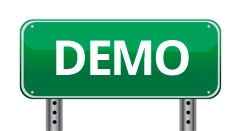The usual question relating to using a demo account normally consists of how long to remain in demo account before moving up to trading the real market with real money. However, there are overlooked benefits of using demo accounts over and above that one dimensional question and the fact that many experienced and profitable forex traders still use demo accounts is testament to their value.
There are many benefits to trading with your broker in demo mode before moving up to trading in mini or micro lots and eventually full lots. The most obvious of which is zero risk. As marketing tools the demo account is arguably the most valuable in the array of initial communication tools the broker has to offer, whilst the opportunity to capture basic contact details from a potential client works for the broker it can be a surprising observation that the demo account is in fact actually heavily weighted in favour of the forex trader.
After the broker has delivered you their basic business card, in the form of a demo account opening, consider the demo account as putting the new broker on trial; you'll now put the broker through a series of stringent and exacting tests to see if they come up to scrutiny and your personal standards. With the competition currently fierce amongst FX brokers you have every opportunity to be as vigorous in your evaluation as you deem necessary. Let's look at some the metrics we can put in place to evaluate the broker's delivery.
Firstly the ease of account opening; the demo account form should be straightforward asking for the barest of contact information and no financial information should be requested. Secondly the account opening should be immediate, you should be operating in demo mode within minutes of the initial form filing. In short you should require no more than a user name and password to be up and running. The next stage is to test the platforms on offer.
Whilst bespoke and proprietary platforms are evident and highly usable in most instances many forex traders of experience would point to Meta Trader and Currenex as being the obvious choices for the more professional end of the retail market place. Now I know what you're thinking; "well he would say that 'cos that's what's on offer with FXCC" but it's fact. When questioned eight of ten cats chose the platform with whiskers as opposed to bells and whistles. Moving aside the lame and partial reference to a cat food advert (which ran in the UK for decades) that metric does in fact stand up to closer scrutiny, the more professional retail FX traders, and many institutional traders working for hedge funds, use MT4/5 and Currenex.
It's no accident that the select ECN NDD brokers prefer the clarity, transparency and effortless ease of use for both parties. Why re-invent the wheel, or add modifications to a thoroughly bench tested product with thousands of hours live market testing? There are brokers who will, for example, modify the Currenex platform and re-brand it, however, being open and 'pure play' should surely extend to all facets of the business. Many brokers will testify that their demo and real account prices are the same. Therefore in demo mode you should be demo trading the real market price and if using an ECN broker you're not dealing with or through a market maker.
There are other ways to test the broker whilst in demo mode, for example how will your new potential broker respond to your emails or telephone requests for assistance if you're in demo mode? Did they respond in a speedy and courteous manner, did they know who you were by referencing your username, did they solve the problem or question and if not and they promised to deliver a solution was it finally executed to your satisfaction, in short did they fulfil their promise? It's fair to say that if a broker's service is exemplary whilst you're in demo mode you'll be far more encouraged and motivated to open a full account with them. Shortly after opening a demo account having left a contact telephone number the broker should (as a matter of courtesy) call you to see what you think of the platform, the spreads and the overall level of service thus far. In point of fact this diarising of contact should continue right through the relationship. This initial contact is your chance to further evaluate the broker.
Even the most experienced and profitable traders still have and use demo accounts, primarily for bench testing ideas and trading strategies. As intellectually curious individuals we're all striving for continual improvement in a market place that is constantly evolving and never 'fixed'. Therefore we should all have demo accounts to hand in order to risk virtual money before risking real money. The difference being that there's then a jump; experienced traders bypass the micro or mini lot stage as their demo account will (in all likelihood) already be with a broker and on the platform they prefer and trust. As a re-cap here's a simple checklist to evaluate the quality of the broker's demo account.
[unordered_list style=”tick”]
- Unlimited use of demo account, or a simple re-activation method
- All conditions match the live account environment
- Free charting and access to all the other proprietary information and tutorial library the broker has
- Live chat, access to the economic indicators
- An account manager from day one
[/unordered_list]






Comments are closed.